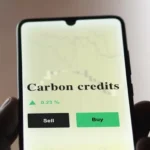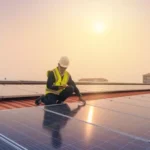Another Step Towards Net-Zero Economy

The push for Electric Vehicle (EV) ecosystem creation and the large-scale roll-out of e-buses through payment security mechanisms will decarbonise the mobility sector while propelling India as a potential EV manufacturing hub
Indian Finance Minister Nirmala Sitharaman unveiled ambitious plans during her Budget 2024 speech, aiming to significantly advance India’s renewable energy agenda. Central to this initiative is the rooftop solar scheme, which aims to solarise the rooftops of 10 million households. This move is projected to deliver substantial savings, with households expected to save up to Rs 18,000 annually by selling surplus solar electricity to distribution companies.
Additionally, the government plans to mandate the phased blending of compressed biogas (CBG) with compressed natural gas (CNG) for transport and natural gas (PNG) for domestic purposes. Furthermore, in pursuit of net-zero carbon emissions, the government will provide viability gap funding to harness offshore wind energy potential, starting with an initial capacity of one gigawatt. These efforts align with India’s commitment to achieving net-zero emissions by 2070 and having 50 per cent of its electricity capacity sourced from non-fossil fuel sources by 2030. According to statistics from the International Renewable Energy Agency (IREA), India currently ranks fourth globally in renewable energy installed capacity, fourth in wind power capacity, and fifth in solar power capacity.
Saurabh Kumar, Vice President of India for the Global Energy Alliance for People and Planet (GEAPP), hailed the interim Union Budget 2024 as a significant milestone in India’s journey towards a net-zero economy by 2070. He praised the government’s vision of Viksit Bharat, emphasising energy security and the promotion of accessible, affordable and clean energy. Kumar noted that the rooftop solar scheme represents a pivotal moment in scaling India’s clean energy aspirations. Furthermore, he highlighted the government’s efforts to create an Electric Vehicle (EV) ecosystem and facilitate the large-scale rollout of e-buses through payment security mechanisms. These initiatives not only aim to decarbonise the mobility sector but also position India as a potential hub for EV manufacturing.
The statement of a corpus of INR 1 lakh crore is seen as a significant step to attract private investment in innovation, research, and development in the clean energy sector. This move underscores the government’s commitment to fostering innovation and accelerating the transition towards a sustainable energy future.


















































































































































































































































































































































































































































































































































































































































































































































































































































